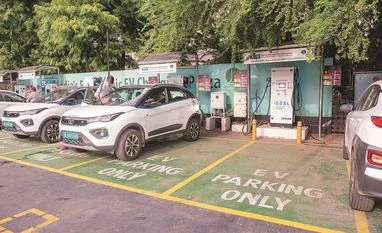The Internet and Mobile Association of India (IAMAI) has warned that the Delhi government’s scheme mandating cab aggregators and delivery service providers to completely convert to electric vehicles (EV) by 2030 may significantly disrupt business activities and livelihoods of gig workers.
“The EV conversion targets prescribed in the scheme appear to be based on assumptions of ecosystem maturity rather than evidence-based research. It is imperative the government recognise that the paucity of charging stations and battery-swapping infrastructure in the capital make the scheme’s ambitious targets virtually impossible to meet,” the industry body said in a statement.
The Delhi government last month announced a draft ‘Motor Vehicle Aggregator Scheme 2023’ aimed at regulating cab aggregators and delivery service providers in the city. The scheme has proposed several rules for the vehicles including mandatory panic buttons in taxis, integration with emergency response number '112', and phase-wise transition to electric vehicles (EV).
“The EV conversion targets prescribed pose a significant risk to gig workers who have heavily invested their capital, often through loans, in internal combustion engine (ICE) powered vehicles. Moreover, the extremely high costs associated with owning an EV make it a commercially unfeasible option for most gig workers in the capital,” IAMAI said.
Earlier this week over 1,500 cab drivers conveyed their concerns about the financial implications of the scheme in a letter to Delhi Transport Minister Kailash Gahlot.
IAMAI further said that the target of 100 per cent electrification of bike taxis operating in Delhi right from the outset also raises serious concerns as the lack of a moratorium for bike taxis could render numerous gig workers without work overnight.
Delhi’s Chief Minister Arvind Kejriwal has previously said that the scheme aimed to achieve the twin objectives of prioritising the safety of passengers while promoting the use of electric vehicles to reduce pollution. A draft of the scheme is currently waiting for the approval of Delhi’s Lieutenant-Governor.
More From This Section
On the scheme’s provisions about consumer grievances, IAMAI urged the government to adopt a graded approach to addressing consumer complaints based on their urgency and nature.
Regarding the scheme’s data storage requirements, the industry body of digital services companies requested the Delhi government refrain from imposing such obligations as the storage and sharing of personal data is set to be more comprehensively addressed by the central government through the Digital Personal Data Protection Bill, 2022.
Lastly, IAMAI recommended an escalation mechanism before the imposition of penalties to ensure a fair and transparent process for all stakeholders involved.
)